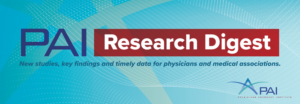
PAI partnered with NORC at the University of Chicago to examine the “employed” physician experience—from the impact on patient care, to clinical decision making, to influences and factors driving the growing trend of corporate practice. The survey provides an unprecedented inside look at the shifting physician employment landscape and offers key insights into the implications of the last decade’s dramatic increase in corporations owning physician practices for both patients and physicians.
Among the survey’s broad range of findings, most concerning is that nearly 60% of physicians practicing in hospital- or corporate-owned settings say non-physician ownership reduces the quality of patient care—with more than 80% of these physicians citing reduced autonomy as a driving factor.
Report: The Impact of Practice Acquisitions and Employment on Physician Experience and Care Delivery
PAI and NORC at the University of Chicago | 2023
Key Findings
CARE DELIVERY
Physicians report concerning trends in care delivery, indicating reduced autonomy, strained patient relationships and diminished communication due to ownership changes.
- Almost 60% of physicians reported that reduced autonomy was one of the top negative impacts of ownership changes on patient care quality
- Nearly half of physicians (45%) reported that ownership changes worsened their relationships with patients
Decreased time and communication were reported (80%) as top negative impacts of ownership changes on the physician-patient relationship.
CLINICAL DECISION MAKING
Physician responses underscore the complexities involved in making clinical decisions for their patients, including employers’ policies that influence these decisions.
- 56% of respondents said that cost of care to the patient has some impact on their clinical decision making
- 47% of respondents said that practice policies or incentives led them to adjust treatment options to reduce costs
- 37% of physicians report moderate or low autonomy in making clinical decisions
- 61% of respondents have moderate or low autonomy to refer patients outside of their ownership structure/system
- 70% of respondents report their employer uses incentives for physicians to see more patients
45% of physicians reported policies that influence or limit their decision making on drug therapies for patients
ADMINISTRATION
Two-thirds of physicians report having little or no involvement in practice management policies.
- Over 40% of respondents expressed dissatisfaction with workforce-related issues including hiring, staff management and administrative support
- Respondents expressed high satisfaction with medical equipment (53%), technology training (36%) and the quality of technology/EHR policies and procedures (37%) at their current practice
Interestingly, more than half (52%) of respondents lacked awareness of a formal process to resolve disputes at their workplace
CAREER PATH & EMPLOYMENT TRENDS
Physicians who moved from independent practice to employment cited a myriad of factors that influenced their decisions with work-life balance and compensation ranking the highest.
- Government and private insurer reimbursement cuts were driving factors in choosing employed positions for over half of physicians who responded to the survey (both 53%)
- 60% of respondents stated that their current employer required them to sign a non-compete agreement
Frustrations with current employment are reflected in the 44% of respondents who said they would join a union if available and amongst the compelling reasons they cited for wanting to retire early—burnout (74%) ranked the highest
